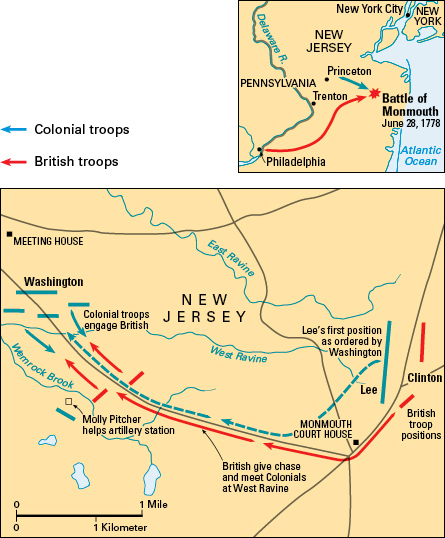Monmouth, Battle of, was a famous battle of the American Revolution (1775-1783). It was fought on a hot day in June 1778, at Monmouth, New Jersey. During the battle, patriot forces led by General George Washington fought British troops led by General Sir Henry Clinton . The two sides fought to a draw. During the fighting, a woman who became known as Molly Pitcher replaced her husband at his artillery station after he fell from heatstroke. She came to represent all the women who assisted the American war effort.
Background.
In June 1778, France joined the American colonists in their war against Britain. The British felt they no longer had the strength to hold both their main base at New York City and their latest conquest, Philadelphia, the patriot capital. They decided to evacuate Philadelphia, which they had occupied following the Battle of Brandywine in September 1777.
British troops under General Clinton left Philadelphia on June 18, 1778. The troops marched across New Jersey toward New York. General Washington’s Continental Army followed them.
The battle.
On June 27, Washington instructed Major General Charles Lee to attack the retreating British army near Monmouth Court House, New Jersey. The battle started the following morning. Soon after it began, the patriots became disorganized and began to retreat. Clinton counterattacked. Washington, in command of the army’s main force, rallied the retreating patriot soldiers. Washington was enraged with Lee for ordering the retreat. A military court later punished Lee for disobeying orders by removing him from command for a year.
After early confusion, the Americans held their ground against several British attacks. The battle ended in a draw. During the night, Clinton’s exhausted forces left the battleground. They continued toward New York. Monmouth was the war’s last major battle in the North. During the course of the battle, about 250 patriot soldiers were killed or wounded. The British lost about 400 men, including dozens who fell from sunstroke.

Molly Pitcher.
The Battle of Monmouth brought notice to a woman named Mary. She had accompanied the regiment of her husband, William Hays, during the war. William was a gunner in the First Pennsylvania Artillery.
According to a popular story, Mary carried water from a nearby spring to her husband’s artillery station. During the battle, Mary’s husband fell from heatstroke. She took his place and helped his crew fire the cannon. She became known as Molly Pitcher , a symbol of women who supported the patriot cause.
